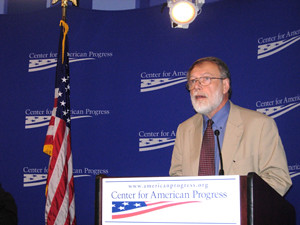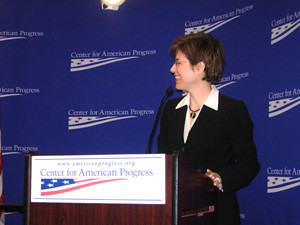Religion’s Role in Politics
With Barack Obama attempting to reach out to conservative Christians, and Focus on the Family’s James Dobson’s rejection, one questions remains: what role should religion play in politics?
David Hollinger, Preston Hotchkis Professor of American History, University of California-Berkeley, quotes Obama in an essay saying that: “I may be opposed to abortion for religious reasons, but if I seek to pass a law banning the practice, I cannot simply point to the teachings of my church or evoke God’s will…”
 Hollinger spoke at the Center for American Progress discussing CAP’s new publication: Debating the Divine, Religion in 21st Century American Democracy. Hollinger argued that “our convention of giving religious ideas a ‘pass’ has made religion a privileged domain for wackiness in the United States.”
Hollinger spoke at the Center for American Progress discussing CAP’s new publication: Debating the Divine, Religion in 21st Century American Democracy. Hollinger argued that “our convention of giving religious ideas a ‘pass’ has made religion a privileged domain for wackiness in the United States.”
“Arguments within faith communities are allowed but the greater the intellectual distance between the potential critic and the person whose beliefs are at issue, the less socially acceptable it is for the critic to speak candidly,” said Hollinger.
However, Melissa Rogers, Visiting Professor of Religion and Public Policy at Wake Forest University Divinity School, argues that people of faith shouldn’t have to “water down” their beliefs to be taken seriously.
“This is no more acceptable than if Christians were to suggest that atheists and agnostics must accept Jesus as their Savior in order to be better Americans,” said Rogers.
An individual’s faith should not eliminate him or her from the political realm, according to Rogers.
“Our tradition of religious freedom recognizes that decisions about ultimate issues are core matters of conscience that should not define a person’s standing in the political community,” said Rogers.
 Eboo Patel, founder and executive director of Interfaith Youth Corps, a Chicago-based international non-profit, argued in his essay that religious pluralism—adding more religious perspectives to the political realm—actually helps and not hinders policies.
Eboo Patel, founder and executive director of Interfaith Youth Corps, a Chicago-based international non-profit, argued in his essay that religious pluralism—adding more religious perspectives to the political realm—actually helps and not hinders policies.
“We have the chance to reinvent John Winthrop’s idea of the city on a hill,” said Patel. “‘The eyes of the world upon us’ in the early 21st century…[and], how are we to be the city on the hill? What if America built a new religious pluralism?”
Patel argued that people of different religions can work together for the “common good.”
“…America was built on people like Martin Luther King, Jr., talking about Negro spirituals and the Constitution,” said Patel. “It’s built on those people articulating the… narrative in a way that not only contributes to the common good but sometimes creating a higher one.”
Patel, who was named one of the “ten young Muslim visionaries shaping Islam in America” by Islamica Magazine, said that religious people can offer a “moral framework” to the public policy debate.
“On issues from global warming, AIDS, and poverty, to abortion and same-sex marriage, religious voters have much to contribute to the public dialogue,” said Patel. “…Religious voices can appeal to our higher selves and challenge us to go beyond self interest to serve the greater good.”
Rogers, a Baptist, agreed with Patel and said that both believers and non-believers can work together to solve today’s crucial issues.
“The tradition teaches us that both the most orthodox believer and the most committed atheist have equal capacities to be excellent Americans, and that both can and should work together to promote the common good,” said Rogers.
Hollinger, Vice President of the Organization of American Historians, argued that “silence” about religion should not be an option. In his essay, he referred to Congressman Mark Souder (R-IN) as an “absolutist” and said that when Al Gore asks himself “what would Jesus do?” public figures should question him.
In response, Rogers said that “conducting our public debate in a spirit of religious freedom also means that arguments used to justify policy positions are fair game for examination, and that arguments based at least partially on religion are certainly not immune from this proposition.”
“We should not tolerate, much less perpetuate, the notion that there is or should be some kind of governmental or civic hierarchy based on what faith a person is or is not,” said Rogers.
Patel argued that faith is an issue that exists at the human core.
“There are things that matter to me deeply that I want my nation to be about, that I want my world to be about,” said Patel. “I would like the people that I’m around…to understand that faith identities matter.”
Patel said it’s unrealistic for people of faith to keep their religion private.
“We are a vibrantly religious nation, and to assume that God talk will somehow remain inside mosques, synagogues, churches, and temples is fantasy,” said Patel.
Melinda Zosh is an intern at the American Journalism Center, a training program run by Accuracy in Media and Accuracy in Academia.




